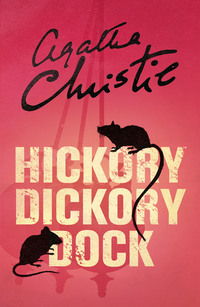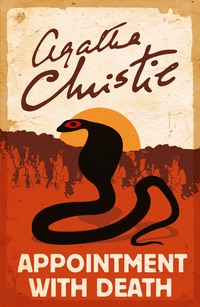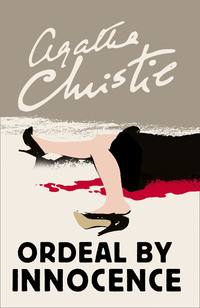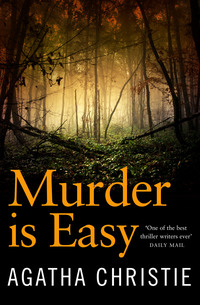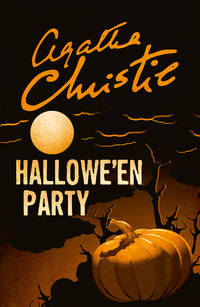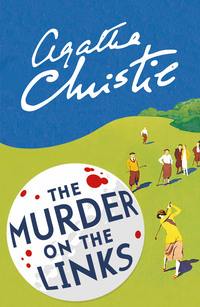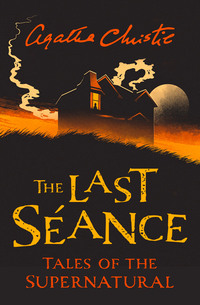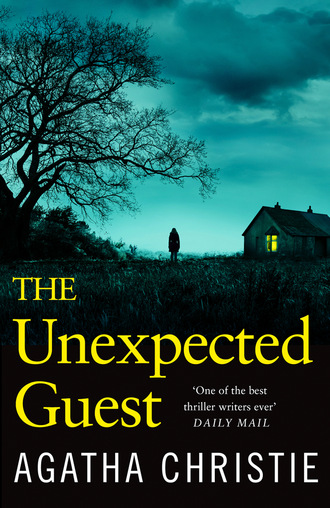
Полная версия

Agatha Christie
The Unexpected Guest
Novelised by Charles Osborne

Copyright
Published by HarperCollinsPublishers Ltd
1 London Bridge Street
London SE1 9GF
www.harpercollins.co.uk
First published in Great Britain by
Collins 1999
Copyright © 1999 Agatha Christie Ltd.
All rights reserved.
www.agathachristie.com
The moral right of the author is asserted
All rights reserved. This book is sold subject to the condition that it shall not, by way of trade or otherwise, be lent, re-sold, hired out or otherwise circulated without the publisher’s prior consent. No part of this text may be reproduced, transmitted, downloaded, reverse engineered, or stored in or introduced into any information storage and retrieval system, in any form or by any means whether electronic or mechanical, now known or hereinafter invented, without the express written permission of HarperCollins ebooks.
Epub Edition 2010 ISBN: 9780007423033
Version: 2020-01-28
Contents
Cover
Title Page
Copyright
Chapter 1
It was shortly before midnight on a chilly November evening,…
Chapter 2
‘By all means,’ the man replied. He ran a hand…
Chapter 3
Starkwedder looked at her with a somewhat bemused expression. ‘Well?’…
Chapter 4
Starkwedder stared at Laura. ‘Richard ran over a child?’ he…
Chapter 5
After closing the door behind Laura, Starkwedder paused, working out…
Chapter 6
At eleven the following morning, Richard Warwick’s study looked somewhat more…
Chapter 7
The inspector thrust Cadwallader’s notebook back at him roughly, as…
Chapter 8
Sergeant Cadwallader closed the door and stood with his back…
Chapter 9
Just then, Sergeant Cadwallader ushered in Jan, who rushed up…
Chapter 10
Crossing the front hall, Miss Bennett paused to admit Starkwedder…
Chapter 11
There was an awkward pause after the police officers had…
Chapter 12
Later that day, towards the end of the afternoon, Julian…
Chapter 13
‘I’m sorry I’ve kept you waiting, Julian,’ Laura called as…
Chapter 14
Julian Farrar and Laura ran towards the house, almost colliding…
Chapter 15
A shocked silence greeted Inspector Thomas’s announcement. Then, hesitantly and,…
Chapter 16
Starkwedder and Inspector Thomas faced each other in silence for…
Chapter 17
Mrs Warwick was silent for a few moments. Then she said…
Chapter 18
Starkwedder looked at Miss Bennett and smiled. ‘You’re pretty sharp, aren’t…
Chapter 19
Miss Bennett beckoned to Jan, then stepped back into the room…
Chapter 20
‘After him! Quickly!’ the inspector shouted to Cadwallader as they…
Chapter 21
Sergeant Cadwallader’s announcement was greeted with a stunned silence. Laura…
Postscript
The Unexpected Guest
Keep Reading …
About the Author
Other Books by Agatha Christie
About the Publisher
Chapter 1
It was shortly before midnight on a chilly November evening, and swirls of mist obscured parts of the dark, narrow, tree-lined country road in South Wales, not far from the Bristol Channel whence a foghorn sounded its melancholy boom automatically every few moments. Occasionally, the distant barking of a dog could be heard, and the melancholy call of a night-bird. What few houses there were along the road, which was little better than a lane, were about a half-mile apart. On one of its darkest stretches the road turned, passing a handsome, three-storey house standing well back from its spacious garden, and it was at this spot that a car sat, its front wheels caught in the ditch at the side of the road. After two or three attempts to accelerate out of the ditch, the driver of the car must have decided it was no use persevering, and the engine fell silent.
A minute or two passed before the driver emerged from the vehicle, slamming the door behind him. He was a somewhat thick-set, sandy-haired man of about thirty-five, with an outdoor look about him, dressed in a rough tweed suit and dark overcoat and wearing a hat. Using a torch to find his way, he began to walk cautiously across the lawn towards the house, stopping halfway to survey the eighteenth-century building’s elegant façade. The house appeared to be in total darkness as he approached the french windows on that side of the edifice which faced him. After turning to look back at the lawn he had crossed, and the road beyond it, he walked right up to the french windows, ran his hands over the glass, and peered in. Unable to discern any movement within, he knocked on the window. There was no response, and after a pause he knocked again much louder. When he realized that his knocking was not having any effect, he tried the handle. Immediately, the window opened and he stumbled into a room that was in darkness.
Inside the room, he paused again, as though attempting to discern any sound or movement. Then, ‘Hello,’ he called. ‘Is anyone there?’ Flashing his torch around the room which revealed itself to be a well-furnished study, its walls lined with books, he saw in the centre of the room a handsome middle-aged man sitting in a wheelchair facing the french windows, with a rug over his knees. The man appeared to have fallen asleep in his chair. ‘Oh, hello,’ said the intruder. ‘I didn’t mean to startle you. So sorry. It’s this confounded fog. I’ve just run my car off the road into a ditch, and I haven’t the faintest idea where I am. Oh, and I’ve left the window open. I’m so sorry.’ Continuing to speak apologetically as he moved, he turned back to the french windows, shut them, and closed the curtains. ‘Must have run off the main road somewhere,’ he explained. ‘I’ve been driving round these topsy-turvy lanes for an hour or more.’
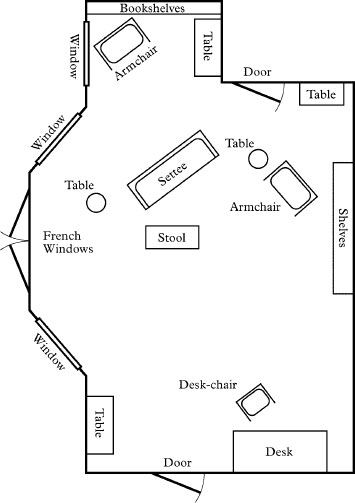
There was no reply. ‘Are you asleep?’ the intruder asked, as he faced the man in the wheelchair again. Still receiving no answer, he shone his torch on the face of the chair’s occupant, and then stopped abruptly. The man in the chair neither opened his eyes nor moved. As the intruder bent over him, touching his shoulder as though to awaken him, the man’s body slumped down into a huddled position in the chair. ‘Good God!’ the man holding the torch exclaimed. He paused momentarily, as though undecided what to do next, and then, shining his torch about the room, found a light switch by a door, and crossed the room to switch it on.
The light on a desk came on. The intruder put his torch on the desk and, looking intently at the man in the wheelchair, circled around him. Noticing another door with a light switch by it, he went across and flicked the switch, thus turning on the lamps on two occasional tables strategically placed around the room. Then, taking a step towards the man in the wheelchair, he gave a start as he suddenly noticed for the first time an attractive, fair-haired woman of about thirty, wearing a cocktail dress and matching jacket, standing by a book-lined recess on the opposite side of the room. With her arms hanging limply by her sides, she neither moved nor spoke. It seemed as though she was trying not even to breathe. There was a moment’s silence while they stared at each other. Then the man spoke. ‘He–he’s dead!’ he exclaimed.
Completely without expression, the woman answered him. ‘Yes.’
‘You already knew?’ asked the man.
‘Yes.’
Cautiously approaching the body in the wheelchair, the man said, ‘He’s been shot. Through the head. Who–?’
He paused as the woman slowly brought her right hand up from where it had been hidden by the folds of her dress. In her hand was a revolver. The man drew in his breath sharply. When it seemed that she was not threatening him with it, he approached her, and gently took the gun from her. ‘You shot him?’ he asked.
‘Yes,’ the woman replied, after a pause.
The man moved away from her, and put the gun on a table by the wheelchair. For a moment he stood looking at the dead body, and then gazed uncertainly around the room.
‘The telephone is over there,’ said the woman, nodding towards the desk.
‘Telephone?’ the man echoed. He sounded startled.
‘If you want to ring up the police,’ the woman continued, still speaking in the same detached, expressionless manner.
The stranger stared at her as though unable to make her out. Then, ‘A few minutes one way or the other won’t make any difference,’ he said. ‘They’ll have a bit of a job getting here in this fog anyway. I’d like to know a little more–’ He broke off and looked at the body. ‘Who is he?’
‘My husband,’ replied the woman. She paused, and then continued, ‘His name is Richard Warwick. I am Laura Warwick.’
The man continued to stare at her. ‘I see,’ he murmured finally. ‘Hadn’t you better–sit down?’
Laura Warwick moved slowly and somewhat unsteadily to a sofa. Looking around the room, the man asked, ‘Can I get you a–drink–or something? It must have been a shock.’
‘Shooting my husband?’ Her tone was drily ironic.
Appearing to regain his poise somewhat, the man attempted to match her expression. ‘I should imagine so, yes. Or was it just fun and games?’
‘It was fun and games,’ replied Laura Warwick inscrutably as she sat down on the sofa. The man frowned, looking puzzled. ‘But I would like–that drink,’ she continued.
The man took off his hat and threw it onto an armchair, then poured brandy from a decanter on the table close to the wheelchair and handed her the glass. She drank and, after a pause, the man said, ‘Now, suppose you tell me all about it.’
Laura Warwick looked up at him. ‘Hadn’t you better ring the police?’ she asked.
‘All in good time. Nothing wrong with having a cosy little chat first, is there?’ He took off his gloves, stuffed them into his overcoat pocket, and started unbuttoning his coat.
Laura Warwick’s poise began to break. ‘I don’t–’ she began. She paused and then continued, ‘Who are you? How did you happen to come here tonight?’ Without giving him time to answer, she went on, her voice now almost a shout, ‘For God’s sake, tell me who you are!’
Chapter 2
‘By all means,’ the man replied. He ran a hand through his hair, looked around the room for a moment as though wondering where or how to begin, and then continued, ‘My name’s Michael Starkwedder. I know it’s an unusual name.’ He spelt it out for her. ‘I’m an engineer. I work for Anglo-Iranian, and I’m just back in this country from a term in the Persian Gulf.’ He paused, seeming briefly to be remembering the Middle East, or perhaps trying to decide how much detail to go into, then shrugged his shoulders. ‘I’ve been down here in Wales for a couple of days, looking up old landmarks. My mother’s family came from this part of the world and I thought I might buy a little house.’
He shook his head, smiling. ‘The last two hours–more like three, I should think–I’ve been hopelessly lost. Driving round all the twisting lanes in South Wales, and ending up in a ditch! Thick fog everywhere. I found a gate, groped my way to this house, hoping to get hold of a telephone or perhaps, if I was lucky, get put up for the night. I tried the handle of the french window there, found it wasn’t locked, so I walked in. Whereupon I find–’ He gestured towards the wheelchair, indicating the body slumped in it.
Laura Warwick looked up at him, her eyes expressionless. ‘You knocked on the window first–several times,’ she murmured.
‘Yes, I did. Nobody answered.’
Laura caught her breath. ‘No, I didn’t answer.’ Her voice was now almost a whisper.
Starkwedder looked at her, as though trying to make her out. He took a step towards the body in the wheelchair, then turned back to the woman on the sofa. To encourage her into speaking again, he repeated, ‘As I say, I tried the handle, the window wasn’t locked, so I came in.’
Laura stared down into her brandy glass. She spoke as though she were quoting. ‘“The door opens and the unexpected guest comes in.”’ She shivered slightly. ‘That saying always frightened me when I was a child. “The unexpected guest”.’ Throwing her head back she stared up at her unexpected visitor, and exclaimed with sudden intensity, ‘Oh, why don’t you ring up the police and get it over?’
Starkwedder walked over to the body in the chair. ‘Not yet,’ he said. ‘In a moment, perhaps. Can you tell me why you shot him?’
The note of irony returned to Laura’s voice as she answered him. ‘I can give you some excellent reasons. For one thing, he drank. He drank excessively. For another, he was cruel. Unbearably cruel. I’ve hated him for years.’ Catching the sharp look Starkwedder gave her at this, she continued angrily, ‘Oh, what do you expect me to say?’
‘You’ve hated him for years?’ Starkwedder murmured as though to himself. He looked thoughtfully at the body. ‘But something–something special–happened tonight, didn’t it?’ he asked.
‘You’re quite right,’ Laura replied emphatically. ‘Something special indeed happened tonight. And so–I took the gun off the table from where it was lying beside him, and–and I shot him. It was as simple as that.’ She threw an impatient glance at Starkwedder as she continued, ‘Oh, what’s the good of talking about it? You’ll only have to ring up the police in the end. There’s no way out.’ Her voice dropped as she repeated, ‘No way out!’
Starkwedder looked at her from across the room. ‘It’s not quite as simple as you think,’ he observed.
‘Why isn’t it simple?’ asked Laura. Her voice sounded weary.
Approaching her, Starkwedder spoke slowly and deliberately. ‘It isn’t so easy to do what you’re urging me to do,’ he said. ‘You’re a woman. A very attractive woman.’
Laura looked up at him sharply. ‘Does that make a difference?’ she asked.
Starkwedder’s voice sounded almost cheerful as he replied, ‘Theoretically, certainly not. But in practical terms, yes.’ He took his overcoat over to the recess, put it on the armchair, and returned to stand looking down at the body of Richard Warwick.
‘Oh, you’re talking about chivalry,’ Laura observed listlessly.
‘Well, call it curiosity if you prefer,’ said Starkwedder. ‘I’d like to know what this is all about.’
Laura paused before replying. Then, ‘I’ve told you,’ was all she said.
Starkwedder walked slowly around the wheelchair containing the body of Laura’s husband, as though fascinated by it. ‘You’ve told me the bare facts, perhaps,’ he admitted. ‘But nothing more than the bare facts.’
‘And I’ve given you my excellent motive,’ Laura replied. ‘There’s nothing more to tell. In any case, why should you believe what I tell you? I could make up any story I liked. You’ve only got my word for it that Richard was a cruel beast and that he drank and that he made life miserable for me–and that I hated him.’
‘I can accept the last statement without question, I think,’ said Starkwedder. ‘After all, there’s a certain amount of evidence to support it.’ Approaching the sofa again, he looked down at Laura. ‘All the same, it’s a bit drastic, don’t you think? You say you’ve hated him for years. Why didn’t you leave him? Surely that would have been much simpler.’
Laura’s voice was hesitant as she replied, ‘I’ve–I’ve no money of my own.’
‘My dear girl,’ said Starkwedder, ‘if you could have proved cruelty and habitual drunkenness and all the rest of it, you could have got a divorce–or separation–and then you’d get alimony or whatever it is they call it.’ He paused, waiting for an answer.
Finding it difficult to reply, Laura rose and, keeping her back to him, went across to the table to put her glass down.
‘Have you got children?’ Starkwedder asked her.
‘No–no, thank God,’ Laura replied.
‘Well, then, why didn’t you leave him?’
Confused, Laura turned to face her questioner. ‘Well–’ she said finally, ‘well–you see–now I shall inherit all his money.’
‘Oh no, you won’t,’ Starkwedder informed her. ‘The law won’t allow you to profit as the result of a crime.’ Taking a step towards Laura, he asked, ‘Or did you think that–?’ He hesitated, and then continued, ‘What did you think?’
‘I don’t know what you mean,’ Laura told him.
‘You’re not a stupid woman,’ Starkwedder said, looking at her. ‘Even if you did inherit his money, it wouldn’t be much good to you if you were going to be imprisoned for life.’ Settling himself comfortably in the armchair, he added, ‘Supposing that I hadn’t come knocking at the window just now? What were you going to do?’
‘Does it matter?’
‘Perhaps not–but I’m interested. What was your story going to be, if I hadn’t come barging in and caught you here red-handed? Were you going to say it was an accident? Or suicide?’
‘I don’t know,’ Laura exclaimed. She sounded distraught. Crossing to the sofa, she sat facing away from Starkwedder. ‘I’ve no idea,’ she added. ‘I tell you I–I haven’t had time to think.’
‘No,’ he agreed. ‘No, perhaps not–I don’t think it was a premeditated affair. I think it was an impulse. In fact, I think it was probably something your husband said. Was that it?’
‘It doesn’t matter, I tell you,’ Laura replied.
‘What did he say?’ Starkwedder insisted. ‘What was it?’
Laura gazed at him steadily. ‘That is something I shall never tell anybody,’ she exclaimed.
Starkwedder went over to the sofa and stood behind her. ‘You’ll be asked it in court,’ he informed her.
Her expression was grim as she replied, ‘I shan’t answer. They can’t make me answer.’
‘But your counsel will have to know,’ said Starkwedder. Leaning over the sofa and looking at her earnestly, he continued, ‘It might make all the difference.’
Laura turned to face him. ‘Oh, don’t you see?’ she exclaimed. ‘Don’t you understand? I’ve no hope. I’m prepared for the worst.’
‘What, just because I came in through that window? If I hadn’t–’
‘But you did!’ Laura interrupted him.
‘Yes, I did,’ he agreed. ‘And consequently you’re for it. Is that what you think?’
She made no reply. ‘Here,’ he said as he handed her a cigarette and took one himself. ‘Now, let’s go back a little. You’ve hated your husband for a long time, and tonight he said something that just pushed you over the edge. You snatched up the gun that was lying beside–’ He stopped suddenly, staring at the gun on the table. ‘Why was he sitting here with a gun beside him, anyway? It’s hardly usual.’
‘Oh, that,’ said Laura. ‘He used to shoot at cats.’
Starkwedder looked at her, surprised. ‘Cats?’ he asked.
‘Oh, I suppose I shall have to do some explaining,’ said Laura resignedly.
Chapter 3
Starkwedder looked at her with a somewhat bemused expression. ‘Well?’ he prompted.
Laura took a deep breath. Then, staring straight ahead of her, she began to speak. ‘Richard used to be a big-game hunter,’ she said. ‘That was where we first met–in Kenya. He was a different sort of person then. Or perhaps his good qualities showed, and not his bad ones. He did have good qualities, you know. Generosity and courage. Supreme courage. He was a very attractive man to women.’
She looked up suddenly, seeming to be aware of Starkwedder for the first time. Returning her gaze, he lit her cigarette with his lighter, and then his own. ‘Go on,’ he urged her.
‘We married soon after we met,’ Laura continued. ‘Then, two years later, he had a terrible accident–he was mauled by a lion. He was lucky to escape alive, but he’s been a semi-cripple ever since, unable to walk properly.’ She leaned back, apparently more relaxed, and Starkwedder moved to a footstool, facing her.
Laura took a puff at her cigarette and then exhaled the smoke. ‘They say misfortune improves your character,’ she said. ‘It didn’t improve his. Instead, it developed all his bad points. Vindictiveness, a streak of sadism, drinking too much. He made life pretty impossible for everyone in this house, and we all put up with it because–oh, you know what one says. “So sad for poor Richard being an invalid.” We shouldn’t have put up with it, of course. I see that, now. It simply encouraged him to feel that he was different from other people, and that he could do as he chose without being called to account for it.’
She rose and went across to the table by the armchair to flick ash in the ashtray. ‘All his life,’ she continued, ‘shooting had been the thing Richard liked doing best. So, when we came to live in this house, every night after everyone else had gone to bed, he’d sit here’–she gestured towards the wheelchair–‘and Angell, his–well, valet and general factotum I suppose you’d call him–Angell would bring the brandy and one of Richard’s guns, and put them beside him. Then he’d have the french windows wide open, and he’d sit in here looking out, watching for the gleam of a cat’s eyes, or a stray rabbit, or a dog for that matter. Of course, there haven’t been so many rabbits lately. That disease–what d’you call it?–myxomatosis or whatever–has been killing them off. But he shot quite a lot of cats.’ She took a drag on her cigarette. ‘He shot them in the daytime, too. And birds.’
‘Didn’t the neighbours ever complain?’ Starkwedder asked her.
‘Oh, of course they did,’ Laura replied as she returned to sit on the sofa. ‘We’ve only lived here for a couple of years, you know. Before that, we lived on the east coast, in Norfolk. One or two household pets were victims of Richard’s there, and we had a lot of complaints. That’s really why we came to live here. It’s very isolated, this house. We’ve only got one neighbour for miles around. But there are plenty of squirrels and birds and stray cats.’
She paused for a moment, and then continued. ‘The main trouble in Norfolk was really because a woman came to call at the house one day, collecting subscriptions for the village fête. Richard sent shots to the right and left of her as she was going away, walking down the drive. She bolted like a hare, he said. He roared with laughter when he told us about it. I remember him saying her fat backside was quivering like a jelly. But she went to the police about it, and there was a terrible row.’
‘I can well imagine that,’ was Starkwedder’s dry comment.
‘But Richard got away with it all right,’ Laura told him. ‘He had a permit for all his firearms, of course, and he assured the police that he only used them to shoot rabbits. He explained away poor Miss Butterfield by claiming that she was just a nervous old maid who imagined he was shooting at her, which he swore he would never have done. Richard was always plausible. He had no trouble making the police believe him.’
Starkwedder got up from his footstool and went across to Richard Warwick’s body. ‘Your husband seems to have had a rather perverted sense of humour,’ he observed tartly. He looked down at the table beside the wheelchair. ‘I see what you mean,’ he continued. ‘So a gun by his side was a nightly routine. But surely he couldn’t have expected to shoot anything tonight. Not in this fog.’
‘Oh, he always had a gun put there,’ replied Laura. ‘Every night. It was like a child’s toy. Sometimes he used to shoot into the wall, making patterns. Over there, if you look.’ She indicated the french windows. ‘Down there to the left, behind the curtain.’
Starkwedder went across and lifted the curtain on the left-hand side, revealing a pattern of bullet holes in the panelling. ‘Good heavens, he’s picked out his own initials in the wall. “RW”, done in bullet holes. Remarkable.’ He replaced the curtain, and turned back to Laura. ‘I must admit that’s damned good shooting. Hm, yes. He must have been pretty frightening to live with.’


